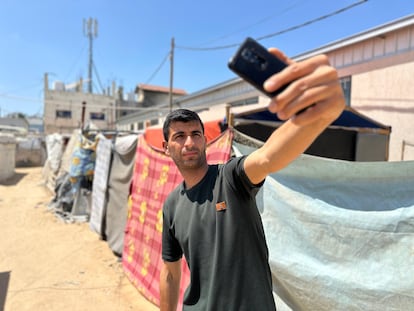“Hello, I'm Ahmed, from Gaza”: Diary of hunger, flight and fear


How do you cook, charge a cell phone, go to the bathroom, or get to sleep when you've lost everything and are living in a displacement camp? Ahmed Abu Kmail, a 38-year-old Palestinian cameraman, is our source of information in this Gaza diary, where the simplest everyday activities have become an unimaginable obstacle course.
Since October 2023, when this war broke out, in which Israel has killed more than 54,000 Palestinians —according to data from the Gaza Ministry of Health, which the UN uses as a reference—Abu Kmail has been forced to move six times with his wife and four children. He currently survives in a precarious tent in the center of the Strip that no longer protects them from the cold or the sun. His house has been bombed, and he knows that even if there is a ceasefire tomorrow, he will not be able to return. “Nothing in Gaza resembles a normal life,” he repeats at various points in this diary.
1. HungerThe more than two million inhabitants of Gaza are starving , and half a million will be in dire straits by September if Israel does not allow the necessary humanitarian aid to enter, according to the latest UN data. For Ahmed Abu Kmail, the image of hunger is an old, empty pot. The one held in the hands of the hundreds of people who have been lining up since dawn at the Nuseirat refugee camp, in the center of the Strip, where a distribution of lentil soup has been organized. If they are lucky, it will probably be their only meal of the day, but some will leave empty-handed .
“Hunger is a slow death,” says Abu Kmail.
At least 90% of Gazans have been displaced at least once since October 2023, and 92% of homes have been totally or partially destroyed in this war. Ahmed Abu Kmail has changed shelters six times. Each flight is more painful and complicated than the last: the tent is more tattered, it's harder to transport their few belongings, and it's difficult to find a place to sleep, as the majority of the population is concentrated in the center of the Strip. Above all, they are more tired and demoralized. In this video, Abu Kmail shows us where his children sleep, the cubicle they have converted into a bathroom, and the leaky solar panel where they try to charge their phones. These are the miserable living conditions to which they have had to brutally adapt overnight. "But despite everything, we haven't lost hope," he says.
The children of Gaza have not been in school since October 7, 2023, when this war began, and even if there were a ceasefire tomorrow, it will take a long time for them to return. According to the UN, 90% of schools need to be rebuilt or rehabilitated. But education is making headway amid the devastation and ruins. Ahmed Abu Kmail takes us to a tent where Hana Abu Rizq, a volunteer teacher, gathers a group of children every day to teach them reading, writing, and addition. We are in a squalid displacement camp, and the tent is stiflingly hot; the children sit on the floor and have barely any notebooks or pencils. “But the idea is to ensure they don’t lose the habit of learning,” the teacher insists.
Gaza is on the Mediterranean coast, but drinking water is scarce and has become another weapon in this war. Ahmed Abu Kmail shows us a distribution point at a small desalination plant that is still operating in the center of the Strip. According to the UN, 89% of Gaza's pipes, drains, and desalination plants have been completely or partially destroyed, and 90% of families have suffered and continue to suffer from a lack of safe drinking water. People waiting in line do not have to pay to fill their containers, but they do have to wait for several hours.
“The war has taken many things from us, including water,” says Abu Kmail. The WHO recommends a minimum of 15 liters of water per person per day to meet basic needs, but in Gaza right now it's around five liters.
The buzzing of Israeli drones in the sky. Day and night. Every day. Gazans have been living like this since October 2023. It's the sound of fear. Fear also comes from the explosions and bombings that can occur at any time, anywhere. "And suddenly, we're just numbers," says Ahmed Abu Kmail, while filming children playing soccer on a street in Deir el-Balah, in the center of the Gaza Strip. And when night falls, the anxiety increases, especially among the children. "I want the drones to go away and the war to end," says Amir, one of the cameraman's sons, by the light of the bonfire with which the family tries to allay their fears.

Journalist specializing in international news. She has been a correspondent in Jerusalem, Caracas, Rio de Janeiro, and Paris, and has worked for the Agence France-Presse (AFP). She is the author of the book "La Revolución Sentimental," about Venezuela, and co-director of the documentary "Condenadas en Gaza." She currently works for the Planeta Futuro section of EL PAÍS.
EL PAÍS









